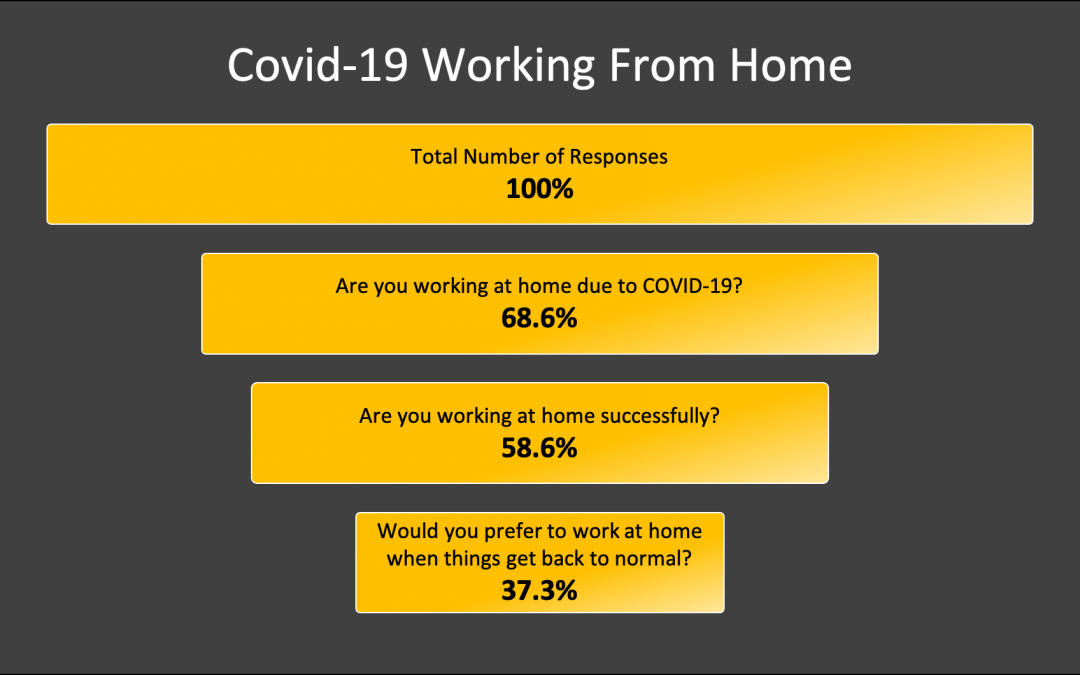by Clive Keyte
As the UK gets to grips with the reality of the COVID-19 national lockdown, it has been interesting to see the effects on daily working patterns.
For example, the Intrafocus team tends to do most of its work online. Our strategy consultants are well-versed in digital business technologies and home working practices. However, many of our customers have been forced to work from home. Most struggled at first. But after a fortnight or so, they found the experience far more manageable. Once our customers had put in place a designated working space and familiarised themselves with some new technology, they were in a position to carry out their jobs quite ably.
As business strategy consultants, we decided to look into this further. We conducted a broad survey across the UK, to which we had 636 responses.
The Covid-19 working from home survey
The questions we asked were:
1. Are you working at home due to COVID-19?
(Answer yes if you are working at home due to the virus, not if you usually work at home.)
2. Are you working at home successfully?
(Have you been able to complete most (80% or more) of your usual work at home?)
3. Would you prefer to work at home when things get back to normal?
(When the COVID-19 crisis is over, would you like to work at home most of the time (50% or more)?)
Of the 636 responses, we found:
69% of the total number surveyed have been forced to work at home (436 respondents)
59% of the total number surveyed said yes, they were able to complete their work at home successfully. That is a massive 86% of the people working at home during the crisis. (373 respondents)
37% of the total number surveyed also said that they would like to continue working at home for the majority of their time (237 respondents).
Survey takeaways
Two clear trends emerged here, which we found particularly interesting.
Firstly, that a surprising number of respondents were already in a position to work from home successfully – completing most of their work, if not all of it. Secondly, a large number of respondents (37%) would like to continue working at home when the crisis is over.
Changes to the working world
It is also interesting to note that the environment has already started to see a benefit from the enforced COVID-19 lockdown period. While economic concerns persist, there has been a considerable reduction in carbon emissions. There has been less congestion in the roads and cities – improving air quality – and less pressure on over-stretched public transport infrastructure.
The rise in home working
We expect to see a permanent change in working practices after the Coronavirus pandemic. Working from home looks set to grow for the longer-term, with employers and employees now seeing the benefits.
To put this into context, before the lockdown, out of a total UK workforce of 32.6 million people, just 1.7 million (5.2%) people worked mainly from home. And around 8.7 million (27%) people have worked from home at some time. The survey shows a staggering increase of 31.8% – even with an accuracy tolerance of plus or minus 5%, this increase deserves serious attention.
Various blockers have been in place to prevent home working from being more popular pre-COVID-19. Not least old-fashioned ‘Management X Theory’ ways of thinking, which suggest that employees are best managed when physically in an office.
The mood is now changing – and we expect that business cultures and models will change too. Particularly when enabled by affordable, powerful and cloud-deployed business networking technologies. As a direct outcome of COVID-19, people may be obliged to continue carrying out social distancing for a year or more – at least until a vaccine is ready. And even then, the shift towards a more flexible, modern and tech-enabled way of working may continue, especially as people wake up to the benefits.
We certainly expect to see companies carrying out a review of home working in a bid to identify flexible working arrangements in the future. These changes can be enabled through the increase in digital technology that facilitates remote working while maintaining communication, collaboration and a sense of team. They can also be activated through business strategies which recognise the full-spectrum value of home working.
The varied benefits of home working
Homeworking approaches – implemented and managed correctly – can benefit all stakeholders. For example:
For businesses
- Reduce the need to maintain costly premises
- Allow businesses to improve their carbon footprint
- Access talented individuals who may live out of a geographic region (for example) on a more flexible basis.
- Potentially increase overall business productivity by harnessing a motivated, happy staff base.
For employees
- Lower costs associated with work – less travel, reduced need for formal workwear, more meals eaten at home etc
- A better work/life balance, potentially with more flexible working hours
- Potential productivity outputs, by reducing stressful commutes and by increasing motivation
- Flexible models which offer the best of all worlds, such as by combining work from home with the social benefits of a weekly team meet-up in person.
For society
- Reduced carbon emissions for environmental benefits
- Better health outcomes, thanks to lower road congestion and fewer damaging C02 emissions
- Enhanced employment outcomes, with jobs potentially available to anyone with a home working space and an internet connection – regardless of physical location.
In conclusion
Obviously, the trend towards greater home working is in its infancy and being driven by the unusual circumstances of the Coronavirus pandemic. Also, this particular survey was focused on office workers rather than the economy as a whole. However, it will be interesting to see how these interim developments pave the way for a more permanent evolution in working patterns. We also suggest that now is the time to implement a good KPI tracking system such as QuickScore to monitor changes during this crisis.
We think that this is one unexpected positive of the lockdown period and feel that it may ultimately result in a net-positive for the economy overall.



